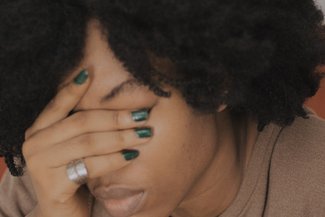
The Mental Health Act: the impact of poverty and domestic abuse
The Mental Health Act is in major need of reform. In the first of two blogs on the Act, we examine the intersections between women's mental health, and poverty and domestic abuse.

16 Apr 2024
In this guest blog, Bethan, Public Affairs and Policy Assistant at Centre for Mental Health, introduces their Mentally Healthier Nation campaign, and highlights its significance for women with multiple unmet needs.
Last September, Centre for Mental Health, alongside Agenda Alliance and over 30 organisations, launched A Mentally Healthier Nation: a 10-year cross-government plan for mental health. The document now has endorsements from more than 60 organisations, and presents a clear vision for parties to adopt into their manifesto work as we head towards a general election.
In recent years, both mental health and gender equity have fallen off the agenda at Westminster, leaving women’s and girls’ mental health at risk. Recently, some ministers have suggested that ‘mental health culture’ has gone too far, a damaging statement which is fundamentally wrong. The reality is that we haven’t gone far enough. The nation’s mental health has been under enormous strain, particularly since the pandemic, and referrals to mental health services are at an all-time high.
Women and girls are at significantly higher risk for multiple mental health problems, notably anxiety, major depression, and eating disorders. Teenage girls are up to three times more likely to be diagnosed with depression globally, and the evidence shows that women were more likely to experience adverse mental health effects from the Covid-19 pandemic.
Addressing gender-based violence, such as experiences of domestic abuse and sexual violence, would significantly improve the chances of good mental health for women and girls. Approximately 7.7% of women in England and Wales have experienced rape and between October 2021 and March 2022, 1.7 million women reportedly experienced domestic violence in England and Wales. Sadly, the prevalence of violence against women is another risk factor that has intensified in the wake of the pandemic.
Recent years have also seen high inflation levels and the associated cost-of-living crisis exacerbate wealth, racial and gender inequalities, disproportionately impacting those already more at risk of experiencing mental health problems. Rates of depression, severe mental illness and suicide worsen with financial insecurity in a clear relationship – the greater the depth and duration of poverty, the worse the outcomes. Research conducted during the pandemic found that over 50% of services supporting women and girls identified financial problems and poverty as key drivers of mental health issues.
Financial difficulties, and other associated risks, such as living in poor housing, do not fall evenly across the population. People from racialised communities are 2.5 times more likely to live in relative poverty, and up to 3 times more likely to be in persistent poverty than white people. The cumulative effect of experiencing racism results in higher rates of mental health problems among racialised women: 29% of Black and mixed race women, and 24% of Asian women has a mental health problem, compared to 21% of White British and 16% of White other women.
Women also face growing disparities associated with detention under the Mental Health Act. There was a 48% increase in the number of women detained on average per month between March and December 2020. With 3.5 times as many Black people detained under the Mental Health Act as white people, the proportion of Black women affected by this is disproportionate to any other demographic.
A Mentally Healthier Nation makes a number of recommendations for how to address these impacts on women’s and girls’ mental health through an intersectional and gender-informed lens, in order to achieve better mental health for everyone. These include:
Find out more about the full Mentally Healthier Nation campaign here.

The Mental Health Act is in major need of reform. In the first of two blogs on the Act, we examine the intersections between women's mental health, and poverty and domestic abuse.

In the second of two blogs on the Mental Health Act, we outline the ways delay to its reform is harming women and girls in terms of their age and race.

Agenda Alliance has today published rare data revealing the link between self-harm, suicidal thoughts and attempts and women’s experience of domestic abuse from a partner.